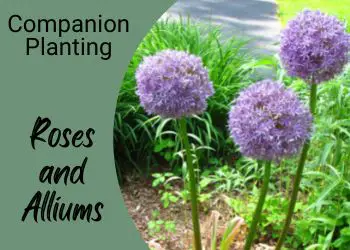We often don’t just plant roses on their own – as wonderful as that can look. Usually, we companion plant them with compatible plants. Roses and alliums are one combination gardeners look at.
Here’s the overview you might be looking for when contemplating planting roses and alliums together, then we’ll get into more details.
Alliums work well with roses. With numerous colors, they will bloom annually around the same period as roses and in similar zones. Their onion scent repels many pests, they help prevent diseases like black spot. Alliums also prefer well-drained soil and lots of sunlight. Be aware of height ratios.
There is more to discuss, like weed suppression and what kind of height differences you might be looking at. Read on to find out more.
Roses and Alliums together
Alliums, also known as exquisite onion plants, are one of the best companions that your roses can have.
That’s why they are also called gardening best friends. So you chose well. Let’s find out by comparing a number of factors.
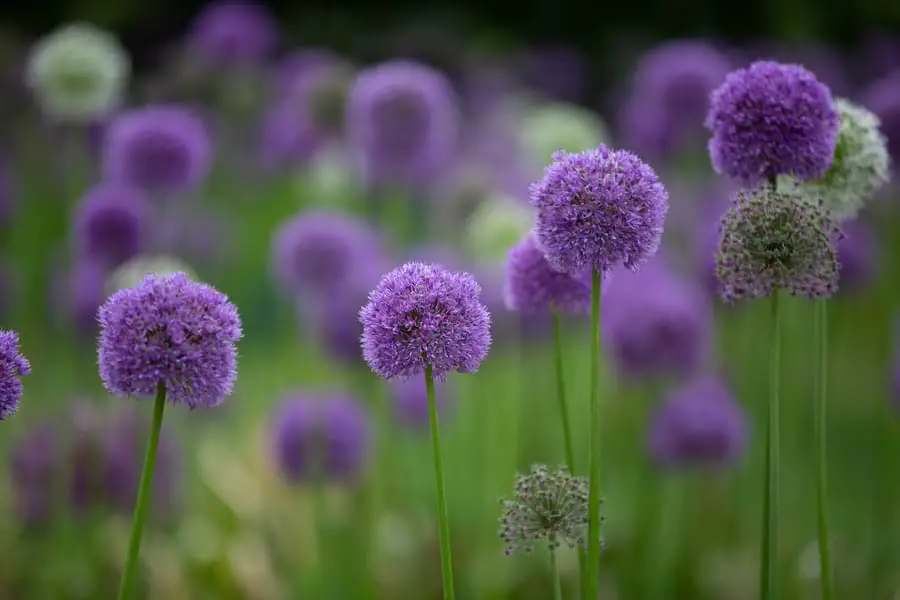
General colors available
Colors can help to maintain the aesthetic flow of the garden, and it can be really stunning to incorporate contrasting pairs.
Similar to roses, alliums are also available in several colors. You may wish to pair the famous purple alliums with red or pink roses.
Similarly, maroon, white, silver, and blue-colored allium bulbs look extremely catching with a variety of rose shades.
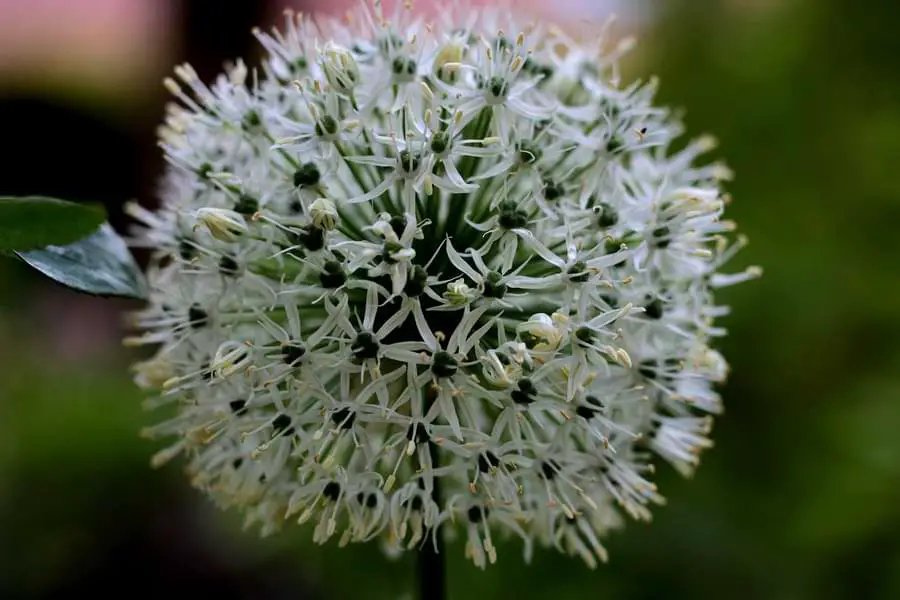
Zones
Roses and alliums also have similar hardiness zones. This adds to their ornamental compatibility while sharing the same soil bed.

As you may know, roses have versatile hardiness zones. From lower hardiness needy zones 7 – 9, to the greater hardiness zones 4, 3, or even 2. Although most are comfortable from zone 5 upward, you can get some roses that suit colder climates too.
Compared to that, alliums have certain species that literally gel in with roses because of the same USDA hardiness zones and compatible requirements.
For example, the Globe-master allium can grow well with all the roses in zones 4 to 8. This ornamental onion blooms in late summer and early spring to complement roses.
And its seed heads are long-lasting and stay in place for weeks even after the flower had diminished.
Another allium called Allium cristophii or star of Persia grows happily in USDA hardiness zones from 5 to 8.
And a special thing about this star-shaped flower is that it comes year after year, thus maintaining the flamboyance of the garden along with roses annually.
Similarly, Allium hollandicum, shoenoprasum (chives), and gladiator have multiple growing zones ranging from 4 to 9 and all of them can make for great rose companions.
Growing height
Now, let’s talk about how tall alliums can grow alongside roses.
All alliums are either shorter in length than the roses… or in some cases, they may grow equal to the smaller varieties like floribunda roses, miniatures, and some shrub roses.
But almost none of the alliums surpass the general rose height of most rose shrubs, Grandifloras, or China tea, and certainly not Hybrid teas.
We’ll chalk this up as a plus point for gardeners trying to maintain the flow of flower bed heights.
Many rose plants are 4-6 feet in general. Compared to this height some alliums like the globe-master grows only 2 – 3 feet. So around 60-90 cm. Similarly, the star of Persia grows only 6 inches to 2 feet in length.
These kinds of height ratios make both of these plants extremely compatible. Just be careful not to select alliums that are likely to get to 4 feet or higher as some do, this might overshadow your roses.
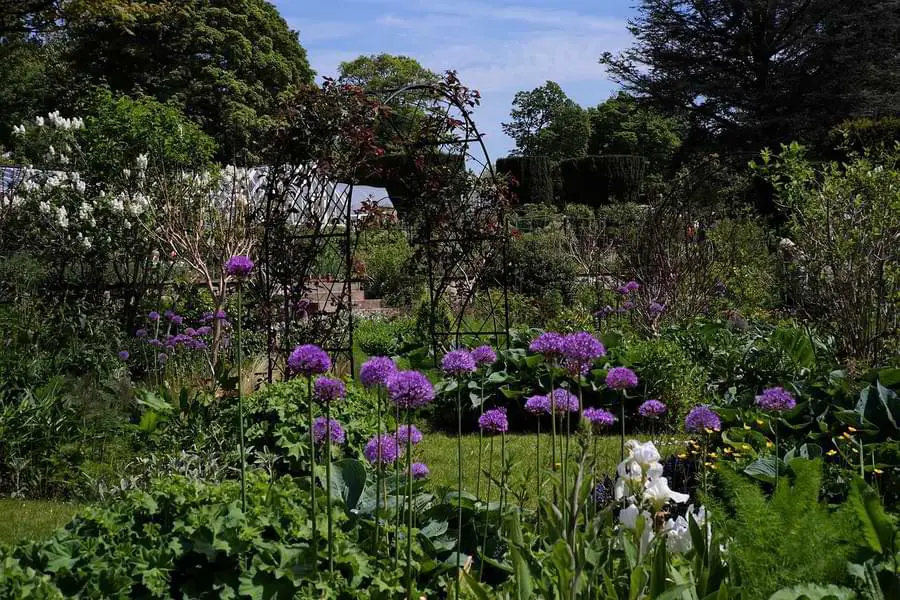
Weed suppressor
Rose companion plants that offer weed suppression can improve the defense against diseases as well as keep weeds down.
Alliums are not as weed-suppressing as others, like lavender for example. They are not likely to carpet the flower bed. But they do have a reasonable spread to them, so they can help.
As it’s an onion species, many expert horticulturists suggest that planting alliums and other onion species near roses can (and should) repel rose aphids and scales.
Not only this, but it can actually help the roses to fight back against the deadly black spot fungus diseases
However, the complete treatment of this disease can only be ensured by using a fungicide.
Attracting pollinators
Alongside all other benefits, one of the best things about alliums is that it helps to strengthen the rose scent when it is planted in the same bed with roses.
And this in turn leads to an increase in visiting pollinators. That is why you will always find some bees and butterflies on your rose-allium pairing.
Thus, it multiplies the pollination and increases the production of the flower.
Find out more about whether roses attract bees here. And here are a few companion-related articles…
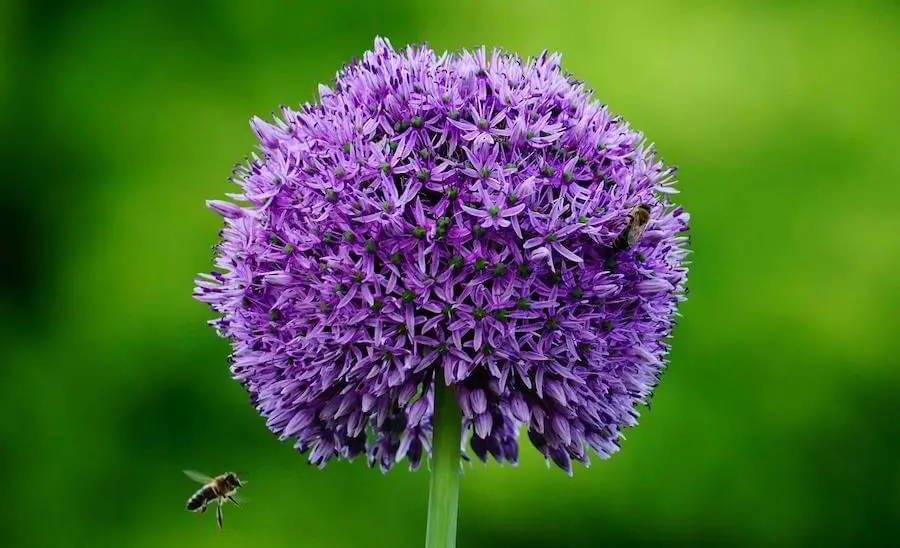
Knock Out roses and Alliums
Knock out® roses and alliums go well together. Both roses and alliums like 6+ hours of full sunlight, both prefer well-drained soil and the blooms of both plants coincide and can look stunning together while adding variety. Alliums also help ward off pests such as aphids.
As members of the onion family, alliums emit an odor undetectable by humans – that will deter most pests. This includes aphids – that often like to target rose plants.
Roses and Alliums Pros and Cons
Here’s a quick-fire list of the pros and cons of companion planting alliums with roses:
Pros
- Allium scent repels pests
- A mix of color varieties
- Alliums like direct sunlight
- Deters diseases
Cons
- May grow taller than roses
Which alliums you could plant with roses
The main criteria for which alliums to plant would be the height. Look for alliums that won’t overshadow your roses at their full height – unless, of course, that is the look you want to go for.
Here are a couple of allium options that are all 1-2 feet in height, and that all like direct sunlight rather than partial shade.
Serendipity Allium
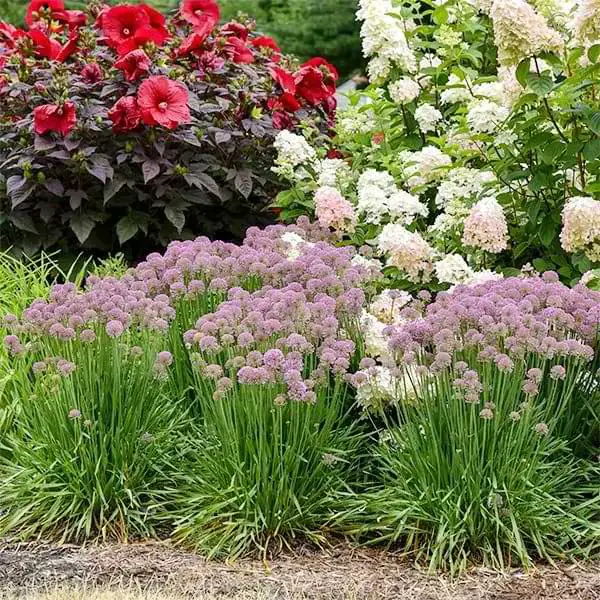
Grows well in zones 4 – 8. They like well-drained soil, are ok in full sunlight, and only grow to a mature height of around 15 – 20 inches.
At this sort of height, it means they will sit nicely in front of most rose plants to cover their spindly legs and create a fuller look.
They will help attract pollinators too, and will only need pruning when your roses do.
Check Availability of Serendipity Alliums
Schuberetii Alliums
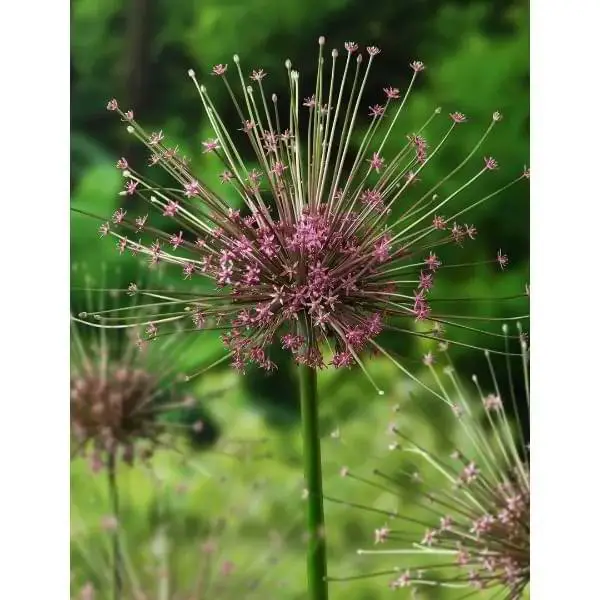
Ideal for zones 3 – 8. With a mature height of around 16 – 20 inches. They grow fast and like well-drained soil as well as direct full sunlight.
They will bloom from early spring to late summer, and then will leave a seed head to adorn your flower bed a little longer after that.
Check Availability of Schubertii Alliums
Roses and Alliums ~ Conclusion 🌹
Whereas I might have some reservations about a number of plants when it comes to alliums during my research I can’t see any downsides to growing these alongside your roses.
As long as you take account of the height and choose wisely, plus look for ones that like direct sunlight as opposed to partial shade, then that is the only potential issue I can see.
Be sure to check out my other articles and also my tools and resources page.
Happy rose growing!

Hi, I’m Michael. My passion for roses was sparked a few years ago after visiting a dedicated community rose garden. So Rosehow.com represents my take, my learnings, and my help for anyone looking to grow, be proud of, and harvest roses.

